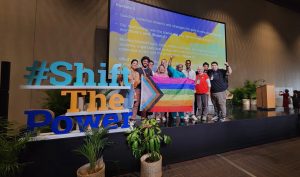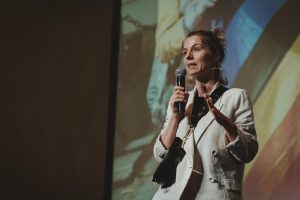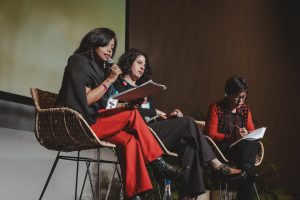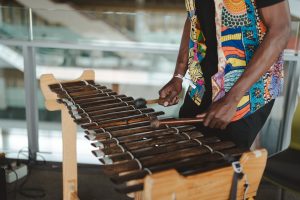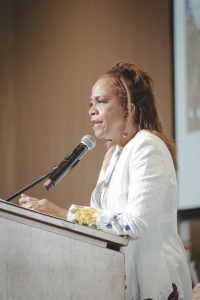Power to breathe: Reflections on my participation at the #ShiftThePower Global Summit 2023
23 Jan 2024
This blog originally appeared in Portuguese on the Comuá Network website.
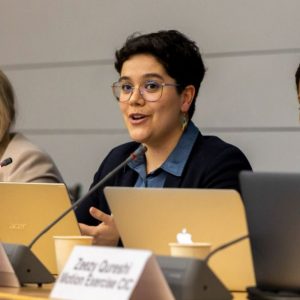
Yasmin Morais, Programe Assistant, Comuá Network
When I landed in Bogotá, my instinct was to stop for a while and fill my lungs with air, realizing that my body, accustomed to living at sea level, felt the need to move more slowly and breathe more deeply. The reason for braving the altitude of the Colombian capital was to accompany my colleagues from the Comuá Network to the #ShiftThePower Global Summit, organized by the Global Fund for Community Foundations. Here, I’ll share some of the reflections I gathered during the event and which have returned with me to Brazil, still reverberating in the exchanges and work we do at Comuá.
When we arrived at the event, the welcome was slow and warm, and soon gave way to long-awaited hugs from people who used to be just windows on Zoom, but who now shared their deep inspirations with us. Right away, you could tell we were moving at a different pace. For us, this was the event’s biggest difference: flexible schedules, time to rest, diverse spaces for listening and quality exchanges with those we were meeting in person for the first (or tenth) time.
Our way of living, influenced by the capitalist modus operandi in which we live, is to rush through events in order to arrive at immediate resolutions and recommendations, or to listen to as many panellists as possible in order to absorb a tenth of what we hear. At the #ShiftThePower Global Summit, this obsession for moving quickly gave way to another priority: taking care of ourselves and other people in order to witness the changes we’ve worked so hard for. We learned how important – and revolutionary – it is to focus on our work, respecting the need to sometimes stop everything and take a breath. For Magda Pocheć, from FemFund (Poland), this is part of regenerative activism, one that resists the capitalist logic of exploiting ourselves in the name of unbridled production, without rest and without space for our human limitations. As she said in her lightning talk during one of the plenary sessions, this is a powerful way of prefiguring other possible futures, until what we believe is also the way we work (“our what is our how”).
As we continued to listen to ourselves and to people from more than 80 countries, we heard, saw and felt many other constructions of what power is – and what it can be. As well as caring and being cared for, power is sharing a meal without meat of animal origin; learning the salsa steps that marked the ground we walked on; practicing and teaching Spanish or Portuguese to our English-speaking partners; inviting them to get to know our diverse and powerful Latinity; taking advantage of the breaks to taste ancestral Colombian drinks and, with them, the indigenous wisdom that has kept the landscape we admired in the corridors of the event alive for so long.
The experience in Bogotá was therefore a way of prefiguring power. To make it less centralized, more diverse, colourful, collective, slow. However, during the event, we couldn’t help but question the power we still need to dismantle so that we can take care of ourselves, our people and our territories with all the strength and power we have always had.
The workshops facilitated throughout the event were important for airing these questions. In the sessions on Measuring What Matters and on Decolonization, both in the context of philanthropy and development, we criticized the colonial and capitalist practices that still permeate the power relations between us, our teams, our partners and funders. We couldn’t help but notice the lack of participation of a significant proportion of influential decision-makers in our field, as well as the feeling that we still have too little in our hands to actually shift power to communities. In addition, the sessions reminded us of the depth of the structures we so desperately want to change. Barry Knight, from the Global Fund for Community Foundations, pointed out that the tools we have today to measure the impact of our work are colonial and designed by the Global North. Similarly, project models demand immediate and scalable results, which goes against the rhythm of social change: non-linear, complex and often slow.
Allied to this, Ambika Satkunanathan, of the Neelam Tiruchelvam Trust (Sri Lanka), in her brilliant talk in one of the plenary sessions, warned us about the risk of making social justice more “palatable” for funders, depoliticizing and “corporatizing” our struggles, so that we serve capitalist interests more than the real needs of our territories. Marie-Rose Romain Murphy, from the Haiti Community Foundation (Haiti), complemented Ambika’s speech with a provocation: “Imagine if people sent in a proposal to fund the revolution!” In short, part of the exercise of transforming power also involves preparing to say no and preserving the values and knowledge that prefigure the power we want.
After all, as Batliwala (2018)[1] points out, power is not just about access to resources and the ability to act on them. Power is also about accessing rights and opportunities; it’s about deciding on the distribution of these resources and on everything that affects us, whether individually or collectively. Power is also having the influence to set agendas and priorities; to speak up and be heard; to have your work valued, whether productive or reproductive.
This complex definition of power reminds us that we exist in hierarchical power relations all the time, including in the spaces of influence of our organizations, as Ambika said in her speech. As we seek to bring these discussions closer to influential actors in the field of philanthropy, it is also important to be aware of our individual, institutional and collective power. What privileges facilitate our access to resources? How do we decide on the distribution of these resources? Which agendas and groups benefit from them? In our context, what does “shifting power” mean in practice?
These are difficult reflections, which become more genuine and deeper when done together. Therefore, a powerful way of decentralizing power is through networks, because they facilitate cooperation between different people, strengthen agendas, and bring more security and trust to those who participate. In Bogotá, some of the hugs that marked me were with the people from the Queer group we had created before the event. With them, I could feel that I wasn’t alone and that the world we had envisioned over the days in Colombia comes closer when we are together. I felt the same way when I met the people from the Territorial Alliance, which was born and has been generated in the Comuá Network. The power of the territories in which the Alliance is located is visible and will be further strengthened through this network.
Thus, the event ended with an individual and collective reinforcement of shifting power where we are, valuing knowledge and political practices that truly contribute to the transformations we seek.
Finally, I’d like to share an excerpt from a poem I wrote when reflecting on our experience at the #ShiftThePower Global Summit.
[…]
deslocar o poder
dá-lo a novas mãos
mãos que o molde
o chacoalhe
o divida
o transfira
o quebre
reconstrua
o lance ao ar
pra enfim chegar lá
nas ruas, vielas
nas putas, favelas
nos muros, aldeias
quilombos, teatros
nas praças, nos rios
nas caras
de quem insistiu
em nos matar
[…]
mudar o poder
pra gente poder decider
mudar o poder
pra gente poder respirar
By: Yasmin Morais, Programe Assistant, Comuá Network
[1] Batliwala, S. (2018), All About Power: Understanding Social Power & Power Structures. New Delhi: CREA.


